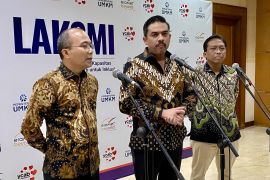"We must not remain as market," Bambang said on the sidelines of the third Sharia Finance Conference in this South Sulawesi capital city on Thursday.
Bambang said one way of increasing the potentials is to make easy access for clients to financing by sharia banks or other sharia financing agencies through synergy with financial technology (Fintech) institutions.
"The presence of sharia banking reduces risks as every transaction needs underlying assets. Currently, there is market that needs expansion of sharia finance. We must not miss the potential," he said.
With the strong presence of sharia banking, he said, there would always be new entrepreneurs or small business players involved in halal industry which in long term, could help push the growth of sharia economy in Indonesia.
"We create sharia finance ecosystem, by contributing to the growth of micro, small and medium enterprises and facilitate financing by sharia banks," Bambang said.
Currently, Indonesia is still lagging behind Malaysia and Britain in sharia finance industry with sharia banks having only a 5 percent share of the banking market in the country.
In addition, Indonesia`s halal products are still not competitive in international market, the minister said.
Separately, Head of Islamic Finance of World Bank Abayomi Alawode gave emphasis on the importance of increase in sharia financial role to cope with economic gap and strengthening sustainability of growth.
The role could be strengthened by making use of financial technology which is now growing fast; give access to financing for UMKM, infrastructure financing, access to financial services and investment in education sector, Abayomi said.
"Utilization of fintech would reduce cost of financial transaction and increase the quality of risk management," he added.
However, a number of risks need to be mitigated from technology innovation development such as uncertainty of regulation, cyber security risk and exploitation of consumers possible as a result of data stealing.
(T.SYS/B/H-ASG/C/S012)
Reporter: antara
Editor: Heru Purwanto
Copyright © ANTARA 2018












